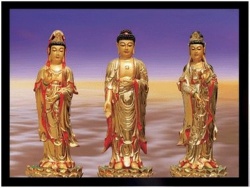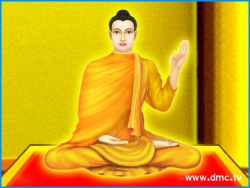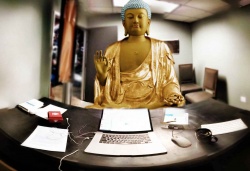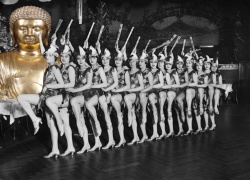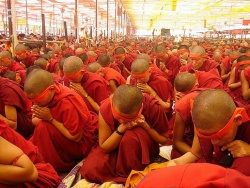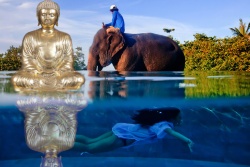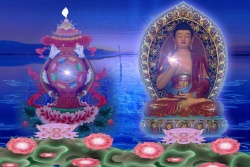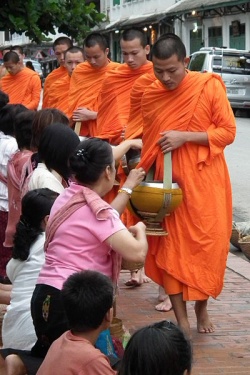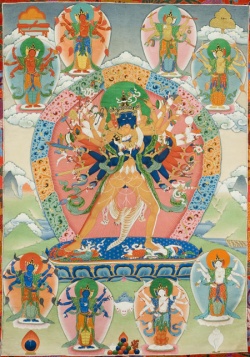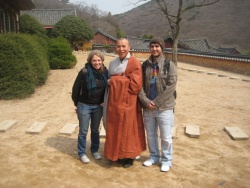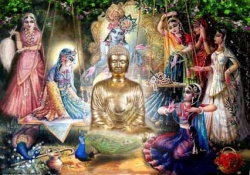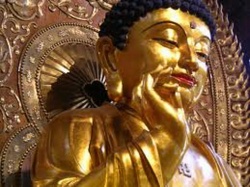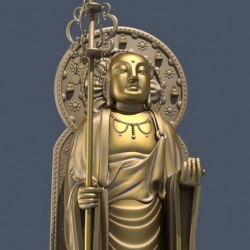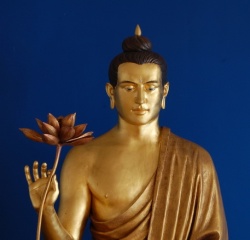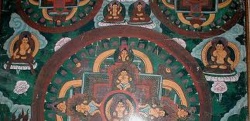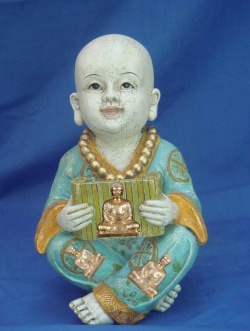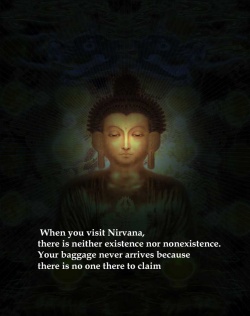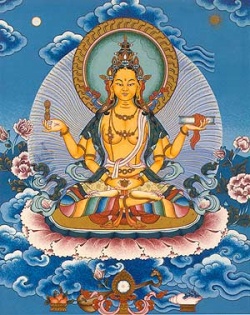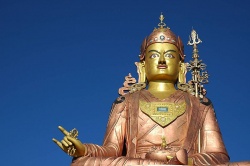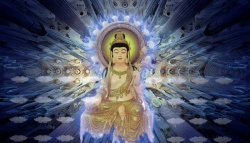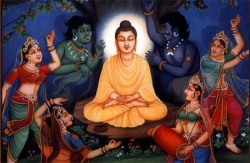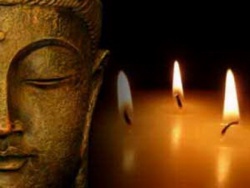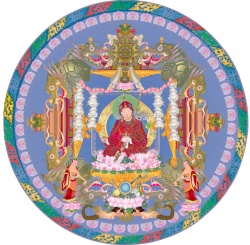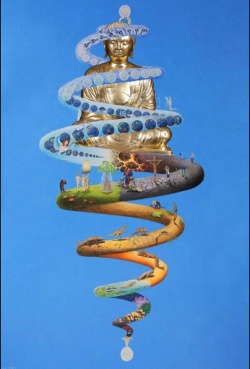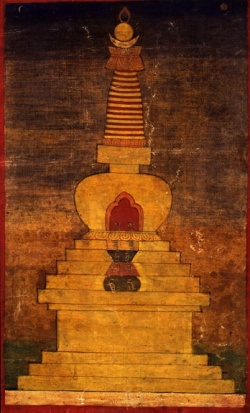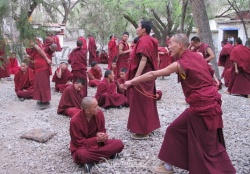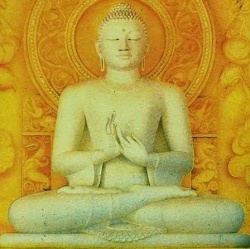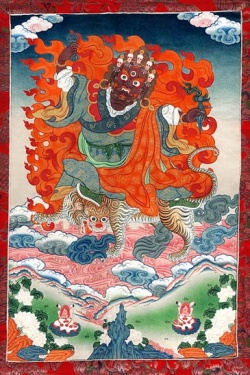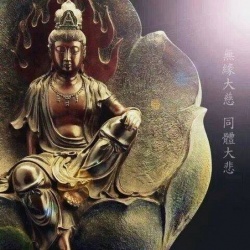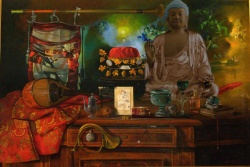Difference between revisions of "Thirty Seven Actions of a Bodhisattva"
(Created page with " The first thing we should do is check our motivation and develop the mind of bodhicitta. Think you want to save all beings that are suffering the three kinds...") |
|||
| Line 1: | Line 1: | ||
| + | <nomobile>{{DisplayImages|2531|2249|1850|155|4530|3788|3795|2810|2945|2566|4469|2384|1117|1097|2345|3721|398|476|1559|659|2611|3225|2017|4517|3137|2095|3053|3311|4357|3405|674|269|2063|2962|2146|3385|267|3983|4402|1350}}</nomobile> | ||
| − | |||
| − | |||
| − | |||
| − | |||
| − | The text starts with a homage to [[Lokeshvara]]. [[Lokeshvara]] is another [[name]] for [[Avalokiteshvara]]. We pay homage to [[Lokeshvara]] through our three gates. To pay homage with the [[body]] means to lower the [[body]]. To pay homage with the {{Wiki|speech}} is to recite verses of praise. To pay homage with the [[mind]] is to have the [[three kinds of faith]]: [[vivid faith]], longing [[faith]], and trusting [[faith]]. [[Vivid faith]] is freedom from conflicting [[emotions]] and [[doubt]]. Longing [[faith]] is the wish to attain the good qualities of the [[object]] of [[faith]]. In [[buddhahood]], all the qualities of the [[buddhas]] are the same. But while following the [[path]], they make different [[aspiration prayers]]. This leads them to have different [[activities]] after [[enlightenment]]. So we should recite [[aspiration prayers]] at all times. The difference between [[aspiration]] and [[dedication]] is the time when the [[merit]] is {{Wiki|present}}. In [[dedication]], we already have gained the [[merit]], in [[aspiration]], we have yet to gain the [[merit]]. [[Avalokiteshvara]] is called the [[protector]] here. He realizes that [[beings]] neither come nor go, but he works continuously for their [[benefit]] and [[joy]]. Once [[suchness]] is seen, there is no coming and going. This is because [[objects]] are [[empty]] and have no substantial [[existence]]. They do not come from anywhere. To act without {{Wiki|conception}} requires that one is on the [[eighth bhumi]] or higher. Today we cannot do this, but someday we will be able to. | + | The first thing we should do is check our [[motivation]] and develop the [[mind of bodhicitta]]. Think you want to save all [[beings]] that are [[suffering]] the three kinds of [[suffering]]. |
| + | |||
| + | In this [[life]] we have [[attained]] the [[precious human body]], which we can use as the basis for the [[liberation]] of ourselves and others. The more we [[meditate]] on [[bodhictta]] the less [[selfish]] we will become. | ||
| + | |||
| + | And the less [[selfish]] we become the [[happier]] we will be, because we are less caught up in [[attachment]] and [[aversion]]. | ||
| + | |||
| + | If we are [[selfish]], we should be wisely [[selfish]] and seek for our [[liberation]]. This kind of [[selfishness]] is the antidote to unwise [[selfishness]]. | ||
| + | |||
| + | If we take the [[idea]] of [[selflessness]] unwisely it will lead remaining in [[samsara]], as we will think there is [[no self]] to {{Wiki|liberate}}. | ||
| + | |||
| + | So accumulating [[merit]] with [[self]] [[grasping]] is a [[skilful means]] that eventually will lead to [[selflessness]]. It's only because of our {{Wiki|fear}} of [[samsara]] that we [[take refuge]] in the [[three jewels]] sincerely. Why do we have to {{Wiki|liberate}} all [[beings]] from [[samsara]]? Think about that. | ||
| + | |||
| + | The difference between [[samsara and nirvana]] is our [[mental state]]. [[Enlightened beings]] are free of [[self]] [[grasping]] and [[afflictive emotions]]. If we are controlled by [[afflictive emotions]], we will [[experience]] [[suffering]]. | ||
| + | |||
| + | For that [[reason]] we need [[liberation]]. How do we {{Wiki|liberate}} ourselves? [[Shantideva]] said that it's not hard to figure out. [[Buddha]] became a [[buddha]] by working for the [[benefit]] of others. And we have remained in [[samsara]] because we have acted selfishly. [[Buddha]] generated [[bodhicitta]] with [[renunciation]]. | ||
| + | |||
| + | When we also practice with this [[attitude]], our practice becomes very profound. [[Virtue]] done from a [[selfish]] [[motivation]] is [[samsaric]] and will not have much [[benefit]]. [[Action]] performed from [[bodhicitta]] will remain until we are [[enlightened]]. | ||
| + | |||
| + | When you act from [[attachment]] [[aversion]] will easily arise. | ||
| + | |||
| + | |||
| + | |||
| + | The main {{Wiki|purpose}} of practice is to attain freedom from [[suffering]]. The [[Buddha]] [[taught]] 84,000 heaps of [[scripture]]. | ||
| + | |||
| + | Even if you only tried to read the [[108]] volumes of [[scripture]] in [[Tibetan]], it would take a long time. | ||
| + | |||
| + | It is hard to understand the key points from the [[sutras]]. Only two great [[masters]] have the qualities needed to summarize the [[sutras]], [[Nagarjuna]] and [[Asanga]]. | ||
| + | |||
| + | So most [[Tibetans]] study their explanations. The 84,000 heaps are summarized in the [[three baskets]] of [[Sutra]], [[Vinaya]], and [[Abhidharma]]. | ||
| + | |||
| + | They are the [[antidotes]] for the [[three root]] [[passions]]: [[Vinaya]] for [[passion]], [[sutra]] for [[aversion]], and [[abhidharma]] for [[ignorance]]. When the [[Buddha]] first [[taught]], his [[monks]] kept their [[morality]] flawlessly, so there was no need for the [[precepts]]. But then [[monks]] behaved improperly and the [[Buddha]] introduced the [[Vinaya]] as this happened. | ||
| + | |||
| + | [[Moral]] law is [[universal]]. No {{Wiki|culture}} will say breaking the first [[five precepts]] is good. So this is not just [[Buddhism's]] law. | ||
| + | |||
| + | [[Buddha]] [[taught]] in a simple way, in accordance with [[reality]]. The chief [[reason]] for the [[precepts]] is {{Wiki|restraint}} of the [[body]], to live a [[peaceful]] [[life]]. | ||
| + | |||
| + | |||
| + | |||
| + | The second {{Wiki|training}} is [[samadhi]], or [[calm abiding]] practice. This is also not just a [[Buddhist practice]], many [[religions]] practice it. But without [[wisdom]], there is no [[liberation]]. [[Emptiness]] is the antidote for all [[afflictive emotions]]. | ||
| + | |||
| + | So it is the most important. But without {{Wiki|training}} in restraining the [[afflictive emotions]], we cannot cannot practice [[samadhi]]. | ||
| + | |||
| + | And without practicing [[samadhi]], we cannot realize [[wisdom]]. Our [[wisdom]] is already {{Wiki|present}}, but it is covered over, like a blanket covering a [[lamp]]. The more we practice [[samadhi]], the more our [[wisdom]] becomes clear. So if you train in [[virtue]], [[samadhi]] is not hard. | ||
| + | |||
| + | And if practice [[samadhi]], [[liberation]] is not hard. The [[three trainings]] are practiced in the [[Mahayana]], [[Mahayana]], and [[Vajrayana]]. They use different methods, but all three practice them. | ||
| + | |||
| + | |||
| + | |||
| + | This text was written by Thogmay [[Zangpo]]. His mother [[died]] when he was very young. He was raised by his father, but his father also [[died]]. So he was raised by his relatives. This is similar to the [[life]] of [[Jigten Sumgon]]. Thogmay [[Zangpo]] was very [[compassionate]]. | ||
| + | |||
| + | He exchanged his [[clothes]] for the lice ridden [[clothes]] of a {{Wiki|beggar}}. | ||
| + | |||
| + | Even though he got sick, he continued to wear them until the lice [[died]] naturally. Thogmay [[Zangpo]] wrote this text from his [[own]] [[experience]], it was not written as a {{Wiki|theory}}. | ||
| + | |||
| + | He got the [[name]] Thogmay ([[Asanga]]) because of his [[brilliance]] in answering questions when he was a [[student]]. | ||
| + | |||
| + | It often happens that a [[great teacher]] has a [[parent]] [[die]] when they are young. So when negative things happen to us, we shouldn't think the [[dharma]] is not working. It is the [[purification]] of your [[karma]], your victory over [[Mara]]. | ||
| + | |||
| + | So bad [[luck]] is a good sign. A sinful [[person]], ready to go to [[hell]], will have [[good fortune]] in this [[life]]. | ||
| + | |||
| + | This is the ripening of their remaining [[good karma]]. In contrast, a good [[person]] will exhaust their [[negative karma]] in this [[life]]. | ||
| + | |||
| + | If [[Milarepa]] had not encountered difficulties, he would not have accomplished [[enlightenment]]. | ||
| + | |||
| + | His uncle and aunt were a [[cause]] of his [[enlightenment]]. | ||
| + | |||
| + | |||
| + | |||
| + | The text starts with a homage to [[Lokeshvara]]. [[Lokeshvara]] is another [[name]] for [[Avalokiteshvara]]. We pay homage to [[Lokeshvara]] through our three gates. To pay homage with the [[body]] means to lower the [[body]]. | ||
| + | |||
| + | To pay homage with the {{Wiki|speech}} is to recite verses of praise. | ||
| + | |||
| + | To pay homage with the [[mind]] is to have the [[three kinds of faith]]: [[vivid faith]], longing [[faith]], and trusting [[faith]]. [[Vivid faith]] is freedom from conflicting [[emotions]] and [[doubt]]. | ||
| + | |||
| + | Longing [[faith]] is the wish to attain the good qualities of the [[object]] of [[faith]]. In [[buddhahood]], all the qualities of the [[buddhas]] are the same. | ||
| + | |||
| + | But while following the [[path]], they make different [[aspiration prayers]]. This leads them to have different [[activities]] after [[enlightenment]]. | ||
| + | |||
| + | So we should recite [[aspiration prayers]] at all times. The difference between [[aspiration]] and [[dedication]] is the time when the [[merit]] is {{Wiki|present}}. | ||
| + | |||
| + | In [[dedication]], we already have gained the [[merit]], in [[aspiration]], we have yet to gain the [[merit]]. [[Avalokiteshvara]] is called the [[protector]] here. He realizes that [[beings]] neither come nor go, but he works continuously for their [[benefit]] and [[joy]]. Once [[suchness]] is seen, there is no coming and going. | ||
| + | |||
| + | This is because [[objects]] are [[empty]] and have no substantial [[existence]]. They do not come from anywhere. | ||
| + | |||
| + | To act without {{Wiki|conception}} requires that one is on the [[eighth bhumi]] or higher. Today we cannot do this, but someday we will be able to. | ||
| + | |||
| + | |||
| + | |||
| + | The [[buddhas]] are the source of temporary [[benefit]] and [[permanent]] [[happiness]], [[ultimate liberation]]. Both come from practicing the [[dharma]]. The [[buddhas]] do not directly give us good things, but they tells us how we can achieve them. | ||
| + | |||
| + | |||
| + | Before practicing [[meditation]] we should study, otherwise our [[meditation]] will be a source of [[ignorance]]. | ||
| + | |||
| + | We should only go to [[retreat]] when we have no questions about our practice, and only lack [[experience]]. | ||
| + | |||
| − | |||
Now comes the explanation of each of the thirty seven verses. | Now comes the explanation of each of the thirty seven verses. | ||
| + | <poem> | ||
Now that you have obtained a [[precious]] [[human]] body,the great boat so difficult to find, | Now that you have obtained a [[precious]] [[human]] body,the great boat so difficult to find, | ||
In order to free yourself and others from the ocean of [[samsara]], | In order to free yourself and others from the ocean of [[samsara]], | ||
To listen, reflect, and [[meditate]] with [[diligence]] day and night | To listen, reflect, and [[meditate]] with [[diligence]] day and night | ||
Is the practice of a [[Bodhisattva]]. | Is the practice of a [[Bodhisattva]]. | ||
| + | </poem> | ||
| + | |||
| + | |||
| + | It is difficult to achieve [[human]] [[birth]] because its [[cause]], keeping the [[precepts]] purely, is difficult. By analogy, it is as difficult as a [[blind]] [[turtle]] that only comes to the surface every hundred years to put its head through a [[yoke]] floating on the surface of the ocean. | ||
| + | |||
| + | This is because [[afflictive emotions]] in the [[lower realms]] are strong and there is nothing to restrain them. | ||
| + | |||
| + | In the [[human realm]], [[afflictive emotions]] are stronger, but there are methods to restrain them. | ||
| + | |||
| + | One example of how [[afflictive emotions]] are stronger in the [[human realm]] is is that [[humans]] will collect things they don't use, which [[animals]] won't do. | ||
| + | |||
| + | |||
| + | |||
| + | [[Hell beings]] are as numerous as dust {{Wiki|particles}} on the [[earth]]. [[Hungry ghosts]] as numerous as sand grains in the [[Ganges]]. [[Animals]] are much nor numerous than [[humans]]. | ||
| + | |||
| + | Among [[humans]], those doing [[bad deeds]] are more numerous than those doing [[good deeds]]. To have [[precious human birth]] means that we can use our [[life]] for a good {{Wiki|purpose}} and [[benefit]]. | ||
| + | |||
| + | It is better than a [[wish fulfilling jewel]], as it can lead to [[liberation]]. Even though our [[life]] is [[precious]], we might not make good use of it. | ||
| + | |||
| + | The [[Jewel Ornament]] mentions [[beings]] of the three capacities, those who practice for temporary [[benefit]], those who practice for [[individual liberation]], and those who practice for the [[liberation]] of all. To practice in any of these [[three ways]] is to use you [[Wikipedia:Human life|human life]] well. | ||
| + | |||
| + | We practice through the [[three wisdoms]]: hearing, contemplation, and [[meditation]]. | ||
| + | |||
| + | Contemplation is {{Wiki|conceptual}} and [[meditation]] is [[non-conceptual]]. [[Cultivation]] may be a better [[word]] than [[mediation]]. | ||
| + | |||
| + | By [[seeing]] the faults of [[samsara]] and qualities of [[enlightenment]], we will practice ceaselessly. [[Samsara]] is like an ocean, deep and wide, seemingly without limit. | ||
| + | |||
| + | We are trapped like a fly in a bottle. The [[twelve links of dependent origination]] [[form]] a continuous chain. When we can break that {{Wiki|continuum}}, we are {{Wiki|liberated}}. | ||
| + | |||
| + | The [[glue]] that binds us is [[attachment]]. | ||
| + | |||
| + | When we realize [[emptiness]], we break the chain of [[attachment]] and [[aversion]]. According to the [[Sutralamkara]] of [[Maitreya]], achieving [[emptiness]] has three [[causes]]. | ||
| + | |||
| + | One must [[meditate]] on [[phenomena]] free of [[elaboration]], please the [[enlightened beings]] by helping others, and practice [[virtue]]. | ||
| + | |||
| + | According to the [[Saraha]], the [[causes]] of [[enlightenment]] are the [[accumulation of merit]] and the [[blessing]] of the guru. | ||
| + | |||
| + | If you have a [[precious]] [[vase]] and use it as a trash can, [[people]] will think you are stupid. But misusing this [[birth]] is even stupider. | ||
| + | |||
| − | |||
| − | |||
[[Passion]] towards friends churns like [[water]]. | [[Passion]] towards friends churns like [[water]]. | ||
| Line 29: | Line 157: | ||
To abandon one's homeland is the practice of a [[Bodhisattva]]. | To abandon one's homeland is the practice of a [[Bodhisattva]]. | ||
| − | Today it's impossible to abandon your fatherland, because [[communication]] has made the [[world]] small. But in the {{Wiki|past}} [[people]] left their home to break [[attachment]]. Even if you have no enemies, your loved ones will have enemies and they will be your enemies. [[Attachment]] to friends and [[aversion]] to enemies is [[endless]], like waves on the ocean. [[Attachment]] [[knows]] no limit. [[Anger]] is like [[fire]], it destroys everything. Whatever we build is done for the [[sake]] of "me". Even [[monasteries]] can be a source of [[attachment]]. I think this is why [[Khenchen Konchog Gyaltsen Rinpoche]] has no [[monastery]]. But it is [[attachment]] that is the problem, not ownership. We need to cut [[attachment]]. Even lay persons can attain [[liberation]] if they have no [[attachment]]. For example, [[Marpa]] [[attained enlightenment]]. | + | |
| + | |||
| + | Today it's impossible to abandon your fatherland, because [[communication]] has made the [[world]] small. But in the {{Wiki|past}} [[people]] left their home to break [[attachment]]. Even if you have no enemies, your loved ones will have enemies and they will be your enemies. | ||
| + | |||
| + | [[Attachment]] to friends and [[aversion]] to enemies is [[endless]], like waves on the ocean. [[Attachment]] [[knows]] no limit. | ||
| + | |||
| + | [[Anger]] is like [[fire]], it destroys everything. Whatever we build is done for the [[sake]] of "me". | ||
| + | |||
| + | Even [[monasteries]] can be a source of [[attachment]]. I think this is why [[Khenchen Konchog Gyaltsen Rinpoche]] has no [[monastery]]. | ||
| + | |||
| + | But it is [[attachment]] that is the problem, not ownership. We need to cut [[attachment]]. Even lay persons can attain [[liberation]] if they have no [[attachment]]. | ||
| + | |||
| + | For example, [[Marpa]] [[attained enlightenment]]. | ||
| + | |||
| + | |||
Giving up negative places, [[Mental afflictions]] gradually {{Wiki|decrease}}. | Giving up negative places, [[Mental afflictions]] gradually {{Wiki|decrease}}. | ||
| Line 36: | Line 178: | ||
To rely on [[solitude]] is the practice of a [[Bodhisattva]]. | To rely on [[solitude]] is the practice of a [[Bodhisattva]]. | ||
| − | Most [[great bodhisattvas]] first practice in secluded places. In these places they are not {{Wiki|physically}} distracted by noise or [[mentally]] distracted by [[emotional]] {{Wiki|disturbances}}. After completing [[retreat]], they go from town to town. But before helping others, you must be able to help yourself. Even a small [[sound]] can easily distract an untrained [[mind]]. You should not practice in places where [[negative actions]] are being performed, because these will increase your [[afflictive emotions]]. When we are free of these {{Wiki|disturbances}}, our [[dharma]] practices improve. Beginners have to practice where practice is easy. When their practice is stabilized, they can practice anywhere. Even [[bodhisattvas]] who [[feel]] [[compassion]] for others must practice this way. | + | |
| + | Most [[great bodhisattvas]] first practice in secluded places. In these places they are not {{Wiki|physically}} distracted by noise or [[mentally]] distracted by [[emotional]] {{Wiki|disturbances}}. | ||
| + | |||
| + | After completing [[retreat]], they go from town to town. But before helping others, you must be able to help yourself. Even a small [[sound]] can easily distract an untrained [[mind]]. | ||
| + | |||
| + | You should not practice in places where [[negative actions]] are being performed, because these will increase your [[afflictive emotions]]. | ||
| + | |||
| + | When we are free of these {{Wiki|disturbances}}, our [[dharma]] practices improve. Beginners have to practice where practice is easy. | ||
| + | |||
| + | When their practice is stabilized, they can practice anywhere. Even [[bodhisattvas]] who [[feel]] [[compassion]] for others must practice this way. | ||
| + | |||
Old friends and relatives will separate. | Old friends and relatives will separate. | ||
| Line 43: | Line 195: | ||
To let go of this [[life]] is the practice of a [[Bodhisattva]]. | To let go of this [[life]] is the practice of a [[Bodhisattva]]. | ||
| − | Don't do everything for this life's [[benefit]]. Focus more on {{Wiki|future}} [[lives]]. This [[life]] lasts at most 115 years. But {{Wiki|future}} [[lives]] are [[endless]]. The next [[life]] should be your aim, but for the next [[life]] you need this [[life]]. By studying [[impermanence]], we can understand [[emptiness]] better. Without [[understanding]] [[impermanence]], everything seems solid. When you have a bad day, you can [[meditate]] on [[impermanence]]. And the same is true when you have a good day. So [[meditating]] on [[impermanence]] keeps your [[mind]] in [[balance]]. What we need is [[diligence]]. When we should do good things, we become lazy. So it helps to consider [[impermanence]] [[to increase]] our [[diligence]]. The better your [[understanding]] of [[impermanence]], the more profound your view in [[mahamudra]] or [[dzogchen]] will be. | + | |
| + | |||
| + | Don't do everything for this life's [[benefit]]. Focus more on {{Wiki|future}} [[lives]]. This [[life]] lasts at most 115 years. But {{Wiki|future}} [[lives]] are [[endless]]. | ||
| + | |||
| + | The next [[life]] should be your aim, but for the next [[life]] you need this [[life]]. By studying [[impermanence]], we can understand [[emptiness]] better. | ||
| + | |||
| + | Without [[understanding]] [[impermanence]], everything seems solid. When you have a bad day, you can [[meditate]] on [[impermanence]]. And the same is true when you have a good day. | ||
| + | |||
| + | So [[meditating]] on [[impermanence]] keeps your [[mind]] in [[balance]]. | ||
| + | |||
| + | What we need is [[diligence]]. When we should do good things, we become lazy. | ||
| + | |||
| + | So it helps to consider [[impermanence]] [[to increase]] our [[diligence]]. The better your [[understanding]] of [[impermanence]], the more profound your view in [[mahamudra]] or [[dzogchen]] will be. | ||
| + | |||
| + | |||
When [[friendship]] with someone | When [[friendship]] with someone | ||
| Line 52: | Line 218: | ||
Is the practice of a [[Bodhisattva]]. | Is the practice of a [[Bodhisattva]]. | ||
| − | We should not abandon our [[compassion]] for bad [[people]], but we must avoid them, so we don't also become a slave of [[negative emotions]]. If a [[person]] with good [[habits]] associates with a [[person]] with bad [[habits]], it's much more likely that the [[person]] with good [[habits]] changes their {{Wiki|behavior}}. We should [[treasure]] our enemy more than our [[parents]]. But until we stabilize our [[minds]], we should stay away from them. | + | |
| + | |||
| + | We should not abandon our [[compassion]] for bad [[people]], but we must avoid them, so we don't also become a slave of [[negative emotions]]. If a [[person]] with good [[habits]] associates with a [[person]] with bad [[habits]], it's much more likely that the [[person]] with good [[habits]] changes their {{Wiki|behavior}}. | ||
| + | |||
| + | We should [[treasure]] our enemy more than our [[parents]]. | ||
| + | |||
| + | But until we stabilize our [[minds]], we should stay away from them. | ||
| + | |||
| + | |||
When in reliance on someone, your defects wane | When in reliance on someone, your defects wane | ||
| Line 58: | Line 232: | ||
To cherish such a [[spiritual friend]] even more than your [[own]] [[body]] | To cherish such a [[spiritual friend]] even more than your [[own]] [[body]] | ||
Is the practice of a [[Bodhisattva]]. | Is the practice of a [[Bodhisattva]]. | ||
| + | |||
| + | |||
Sometimes [[people]] ask me what qualities a [[teacher]] should have. If that [[person]] changes your [[attitude]] for the good, they are a good [[teacher]] for you. If they make your [[attitude]] more negative, then they are not. If you become less [[interested]] in this life's [[benefit]] and more in the next [[life]], they are a good [[teacher]]. | Sometimes [[people]] ask me what qualities a [[teacher]] should have. If that [[person]] changes your [[attitude]] for the good, they are a good [[teacher]] for you. If they make your [[attitude]] more negative, then they are not. If you become less [[interested]] in this life's [[benefit]] and more in the next [[life]], they are a good [[teacher]]. | ||
| + | |||
| + | |||
Themselves captives in the {{Wiki|prison}} of [[samsara]], | Themselves captives in the {{Wiki|prison}} of [[samsara]], | ||
| Line 66: | Line 244: | ||
the [[Three Jewels]], Is the practice of a [[Bodhisattva]]. | the [[Three Jewels]], Is the practice of a [[Bodhisattva]]. | ||
| − | In [[Buddha's]] time [[people]] [[worshipped]] lots of [[local gods]]. [[Buddha]] [[taught]] that you cannot [[take refuge]] in these because they cannot {{Wiki|liberate}} you, because they are not {{Wiki|liberated}} themselves. They are still [[subject]] to [[karma]]. So we need to [[take refuge]] in the undeceiving one who can truly {{Wiki|protect}} us. This is the [[triple gem]], the [[Buddha]], [[Dharma]], and [[Sangha]]. The [[Buddha]] is the fully {{Wiki|liberated}} one. The [[Dharma]] is the [[two truths]], [[relative]] and [[Wikipedia:Absolute (philosophy)|ultimate]]. Some [[people]] say they only want [[the ultimate truth]]. But without [[understanding]] the [[relative]], there is no [[ultimate truth]]. Each of the [[six paramitas]] depends on the previous one. You cannot {{Wiki|renounce}} without first having [[generosity]]. All the great [[teachers]] have said that [[wisdom]] depends upon the first [[five paramitas]]. If your [[preliminary practice]] is profound, your subsequent practice will be profound. The [[Tibetan]] [[word]] for [[Sangha]] means those inclined to [[virtue]]. [[Sangha]] includes both the [[monastic]] and lay [[sangha]], all those who keep their respective [[vows]]. So those are the [[three jewels]]. [[Jigten Sumgon]] said that if you have taken [[refuge]], even if you are stupid as a sheep, you are on the [[path]] to [[buddhahood]]. But if you are a great [[pandita]] and have not taken [[refuge]] you are not on the [[path to enlightenment]] The [[suffering]] of the [[lower realms]], so difficult to bear, | + | |
| + | |||
| + | In [[Buddha's]] time [[people]] [[worshipped]] lots of [[local gods]]. [[Buddha]] [[taught]] that you cannot [[take refuge]] in these because they cannot {{Wiki|liberate}} you, because they are not {{Wiki|liberated}} themselves. They are still [[subject]] to [[karma]]. | ||
| + | |||
| + | So we need to [[take refuge]] in the undeceiving one who can truly {{Wiki|protect}} us. This is the [[triple gem]], the [[Buddha]], [[Dharma]], and [[Sangha]]. | ||
| + | |||
| + | The [[Buddha]] is the fully {{Wiki|liberated}} one. | ||
| + | |||
| + | The [[Dharma]] is the [[two truths]], [[relative]] and [[Wikipedia:Absolute (philosophy)|ultimate]]. Some [[people]] say they only want [[the ultimate truth]]. | ||
| + | |||
| + | But without [[understanding]] the [[relative]], there is no [[ultimate truth]]. | ||
| + | |||
| + | Each of the [[six paramitas]] depends on the previous one. You cannot {{Wiki|renounce}} without first having [[generosity]]. | ||
| + | |||
| + | All the great [[teachers]] have said that [[wisdom]] depends upon the first [[five paramitas]]. If your [[preliminary practice]] is profound, your subsequent practice will be profound. The [[Tibetan]] [[word]] for [[Sangha]] means those inclined to [[virtue]]. [[Sangha]] includes both the [[monastic]] and lay [[sangha]], all those who keep their respective [[vows]]. | ||
| + | |||
| + | So those are the [[three jewels]]. [[Jigten Sumgon]] said that if you have taken [[refuge]], even if you are stupid as a sheep, you are on the [[path]] to [[buddhahood]]. | ||
| + | |||
| + | But if you are a great [[pandita]] and have not taken [[refuge]] you are not on the [[path to enlightenment]] The [[suffering]] of the [[lower realms]], so difficult to bear, | ||
| + | |||
Is the fruit of wrong [[deeds]], so the [[Buddha]] [[taught]]. | Is the fruit of wrong [[deeds]], so the [[Buddha]] [[taught]]. | ||
Therefore, even at the cost of your [[life]], | Therefore, even at the cost of your [[life]], | ||
Never to commit [[negative actions]] | Never to commit [[negative actions]] | ||
Is the conduct of a [[Bodhisattva]]. | Is the conduct of a [[Bodhisattva]]. | ||
| + | |||
This saying is for persons of lesser potential. [[Attachment]] is the [[cause]] for [[rebirth]] as a [[hungry ghost]]. [[Aversion]] is the [[cause]] for [[rebirth]] in [[hell]]. [[Ignorance]] is the [[cause]] for [[rebirth]] as an [[animal]]. As long as you are [[angry]], you will never be [[happy]]. If you are [[attached]], you [[suffer]] from want, as you will not spend what you have. And when you [[suffer]] from [[ignorance]], you [[suffer]] like you were an [[animal]]. Many [[sufferings]] come from {{Wiki|misunderstanding}}. | This saying is for persons of lesser potential. [[Attachment]] is the [[cause]] for [[rebirth]] as a [[hungry ghost]]. [[Aversion]] is the [[cause]] for [[rebirth]] in [[hell]]. [[Ignorance]] is the [[cause]] for [[rebirth]] as an [[animal]]. As long as you are [[angry]], you will never be [[happy]]. If you are [[attached]], you [[suffer]] from want, as you will not spend what you have. And when you [[suffer]] from [[ignorance]], you [[suffer]] like you were an [[animal]]. Many [[sufferings]] come from {{Wiki|misunderstanding}}. | ||
| + | |||
| + | |||
Like dew on the tip of a blade of grass | Like dew on the tip of a blade of grass | ||
| Line 79: | Line 279: | ||
Is the practice of a [[Bodhisattva]]. | Is the practice of a [[Bodhisattva]]. | ||
| − | This saying is for [[beings]] of middling capacity. The [[pleasure]] of [[samsara]] is the [[suffering of change]]. It is not [[permanent]], and when we lose it, we will [[suffer]]. Nobody [[suffered]] because of a slow Internet connection fifty years ago. The [[triple world]] is explained two ways: the first way is the [[lower realms]], [[human]], and [[god realm]]. The second is the [[desire realm]], [[form realm]], and [[formless realms]]. | + | |
| + | This saying is for [[beings]] of middling capacity. The [[pleasure]] of [[samsara]] is the [[suffering of change]]. It is not [[permanent]], and when we lose it, we will [[suffer]]. | ||
| + | |||
| + | Nobody [[suffered]] because of a slow Internet connection fifty years ago. | ||
| + | |||
| + | The [[triple world]] is explained two ways: the first way is the [[lower realms]], [[human]], and [[god realm]]. The second is the [[desire realm]], [[form realm]], and [[formless realms]]. | ||
| + | |||
From [[beginningless]] time your mothers have cherished you. | From [[beginningless]] time your mothers have cherished you. | ||
| Line 85: | Line 291: | ||
Therefore, in order to {{Wiki|liberate}} {{Wiki|limitless}} [[sentient beings]], | Therefore, in order to {{Wiki|liberate}} {{Wiki|limitless}} [[sentient beings]], | ||
Giving rise to [[bodhichitta]] is the practice of a [[Bodhisattva]]. | Giving rise to [[bodhichitta]] is the practice of a [[Bodhisattva]]. | ||
| + | |||
This saying is for [[beings]] of [[highest]] capacity. When our dear ones are [[suffering]], we cannot enjoy anything. So we [[desire]] to {{Wiki|liberate}} them. But to {{Wiki|liberate}} others, we must first {{Wiki|liberate}} ourselves. | This saying is for [[beings]] of [[highest]] capacity. When our dear ones are [[suffering]], we cannot enjoy anything. So we [[desire]] to {{Wiki|liberate}} them. But to {{Wiki|liberate}} others, we must first {{Wiki|liberate}} ourselves. | ||
| + | |||
All [[suffering]] comes from yearning for your [[own]] [[happiness]]. | All [[suffering]] comes from yearning for your [[own]] [[happiness]]. | ||
| Line 94: | Line 302: | ||
When we think of our [[own]] [[benefit]], it is easy for [[afflictive emotions]] to arise. But when we think of others [[benefit]], [[afflictive emotions]] will not arise and we will give rise to positive states instead, eventually leading to [[buddhahood]]. | When we think of our [[own]] [[benefit]], it is easy for [[afflictive emotions]] to arise. But when we think of others [[benefit]], [[afflictive emotions]] will not arise and we will give rise to positive states instead, eventually leading to [[buddhahood]]. | ||
| + | |||
If someone cuts off your head | If someone cuts off your head | ||
| Line 106: | Line 315: | ||
and all your [[virtue]] of the three times | and all your [[virtue]] of the three times | ||
Is the practice of a [[Bodhisattva]]. | Is the practice of a [[Bodhisattva]]. | ||
| + | |||
When someone steals from you, think that [[person]] is helping you practice [[generosity]]. If you get [[angry]] with that [[person]] you are losing your [[bodhisattva vow]]. | When someone steals from you, think that [[person]] is helping you practice [[generosity]]. If you get [[angry]] with that [[person]] you are losing your [[bodhisattva vow]]. | ||
| + | |||
Should someone [[slander]] you | Should someone [[slander]] you | ||
| Line 113: | Line 324: | ||
With a [[heart]] full of [[love]], to proclaim his good qualities in return | With a [[heart]] full of [[love]], to proclaim his good qualities in return | ||
Is the practice of a [[Bodhisattva]]. | Is the practice of a [[Bodhisattva]]. | ||
| + | |||
No {{Wiki|matter}} how much you get [[angry]] it will not repair the damage others do to you. So you should [[feel]] [[compassion]] for them instead. Why [[feel]] [[compassion]]? Because that [[person]] is overcome by [[afflictive emotions]]. | No {{Wiki|matter}} how much you get [[angry]] it will not repair the damage others do to you. So you should [[feel]] [[compassion]] for them instead. Why [[feel]] [[compassion]]? Because that [[person]] is overcome by [[afflictive emotions]]. | ||
| + | |||
If in the middle of a crowd of [[people]] | If in the middle of a crowd of [[people]] | ||
| Line 120: | Line 333: | ||
To see him as a [[spiritual friend]] and to [[bow]] with [[respect]] | To see him as a [[spiritual friend]] and to [[bow]] with [[respect]] | ||
Is the practice of a [[Bodhisattva]]. | Is the practice of a [[Bodhisattva]]. | ||
| + | |||
[[Atisha]] said the best [[spiritual teacher]] is the one who shows your faults. The best oral [[teaching]] is the one who strikes to your [[vital]] point. Think that anyone who criticizes you is your [[teacher]]. | [[Atisha]] said the best [[spiritual teacher]] is the one who shows your faults. The best oral [[teaching]] is the one who strikes to your [[vital]] point. Think that anyone who criticizes you is your [[teacher]]. | ||
| + | |||
If someone whom you dearly cherish like your [[own]] child | If someone whom you dearly cherish like your [[own]] child | ||
| Line 128: | Line 343: | ||
To [[love]] that [[person]] even more | To [[love]] that [[person]] even more | ||
Is the practice of a [[Bodhisattva]]. | Is the practice of a [[Bodhisattva]]. | ||
| + | |||
A [[bodhisattva]] has to deal with many [[beings]]. Some will do crazy things. After your practice is {{Wiki|stable}}, it will be easy to deal with them. Before then, one should keep to [[solitude]]. You should care for a [[person]] who acts this way as if they were your child. | A [[bodhisattva]] has to deal with many [[beings]]. Some will do crazy things. After your practice is {{Wiki|stable}}, it will be easy to deal with them. Before then, one should keep to [[solitude]]. You should care for a [[person]] who acts this way as if they were your child. | ||
| + | |||
Even when someone who is your {{Wiki|equal}} or {{Wiki|inferior}} | Even when someone who is your {{Wiki|equal}} or {{Wiki|inferior}} | ||
| Line 136: | Line 353: | ||
With the same [[respect]] you would accord your [[guru]] | With the same [[respect]] you would accord your [[guru]] | ||
Is the practice of a [[Bodhisattva]]. | Is the practice of a [[Bodhisattva]]. | ||
| + | |||
Normally we respond to the [[negative actions]] of others in kind. A [[bodhisattva]] does not do this. | Normally we respond to the [[negative actions]] of others in kind. A [[bodhisattva]] does not do this. | ||
| + | |||
Though gripped by {{Wiki|poverty}} and always scorned, | Though gripped by {{Wiki|poverty}} and always scorned, | ||
| Line 144: | Line 363: | ||
And never to get discouraged | And never to get discouraged | ||
Is the practice of a [[Bodhisattva]]. | Is the practice of a [[Bodhisattva]]. | ||
| + | |||
This verse describes the practice of [[lojong]], bringing your [[suffering]] onto the [[path]]. This practice is helpful when you get sick. Any [[virtuous]] [[deed]] can help in difficult situations. | This verse describes the practice of [[lojong]], bringing your [[suffering]] onto the [[path]]. This practice is helpful when you get sick. Any [[virtuous]] [[deed]] can help in difficult situations. | ||
| + | |||
Though famous and prominent, someone to whom others [[bow]], | Though famous and prominent, someone to whom others [[bow]], | ||
| Line 152: | Line 373: | ||
And thus to be without [[arrogance]] | And thus to be without [[arrogance]] | ||
Is the practice of a [[Bodhisattva]]. | Is the practice of a [[Bodhisattva]]. | ||
| + | |||
No {{Wiki|matter}} how rich or powerful you are, your gains have no [[essence]]. The [[enjoyment]] from the [[realization]] of [[suchness]] is not like that. [[Chetsang]] [[Rinpoche's]] father was friends with a rich man in [[India]]. But when he visited him, he only heard of his problems. The [[wealth]] of this [[life]] is like borrowing someone else's jewellery. | No {{Wiki|matter}} how rich or powerful you are, your gains have no [[essence]]. The [[enjoyment]] from the [[realization]] of [[suchness]] is not like that. [[Chetsang]] [[Rinpoche's]] father was friends with a rich man in [[India]]. But when he visited him, he only heard of his problems. The [[wealth]] of this [[life]] is like borrowing someone else's jewellery. | ||
| + | |||
If you have not tamed the enemy of your [[own]] [[anger]], | If you have not tamed the enemy of your [[own]] [[anger]], | ||
| Line 159: | Line 382: | ||
Therefore, with an {{Wiki|army}} of [[loving kindness]] and [[compassion]], | Therefore, with an {{Wiki|army}} of [[loving kindness]] and [[compassion]], | ||
To tame your [[own mind]] is the practice of a [[Bodhisattva]]. | To tame your [[own mind]] is the practice of a [[Bodhisattva]]. | ||
| + | |||
It is impossible to get rid of enemies by defeating them, you will only increase them. The only way to get rid of them is by doing good things for them. [[Shantideva's]] {{Wiki|metaphor}} says wearing shoes is {{Wiki|equivalent}} to covering the [[earth]] with leather. | It is impossible to get rid of enemies by defeating them, you will only increase them. The only way to get rid of them is by doing good things for them. [[Shantideva's]] {{Wiki|metaphor}} says wearing shoes is {{Wiki|equivalent}} to covering the [[earth]] with leather. | ||
| + | |||
[[Sense]] [[pleasures]] are like [[salt]] [[water]]. | [[Sense]] [[pleasures]] are like [[salt]] [[water]]. | ||
| Line 167: | Line 392: | ||
Therefore, when something arouses [[attachment]], | Therefore, when something arouses [[attachment]], | ||
To abandon it immediately is the practice of a [[Bodhisattva]]. | To abandon it immediately is the practice of a [[Bodhisattva]]. | ||
| + | |||
[[Samsaric]] [[pleasure]] only increases [[desire]]. The only real [[pleasure]] is the [[realization]] of [[suchness]]. | [[Samsaric]] [[pleasure]] only increases [[desire]]. The only real [[pleasure]] is the [[realization]] of [[suchness]]. | ||
| + | |||
All [[appearances]] are your [[own mind]], and | All [[appearances]] are your [[own mind]], and | ||
| Line 175: | Line 402: | ||
To remain free from [[dualistic]] conceptions | To remain free from [[dualistic]] conceptions | ||
Is the practice of a [[Bodhisattva]]. | Is the practice of a [[Bodhisattva]]. | ||
| + | |||
All [[appearance]] is the play of [[mind]]. If [[objects]] could [[exist]] by themselves, then everyone would see them the same way. Through long [[Wikipedia:Habit (psychology)|habit]], we see our [[perceptions]] as real and solid. In [[reality]] [[phenomena]] are free of the [[eight extremes]]. [[Phenomena]] are like the {{Wiki|reflection}} in a [[mirror]]. | All [[appearance]] is the play of [[mind]]. If [[objects]] could [[exist]] by themselves, then everyone would see them the same way. Through long [[Wikipedia:Habit (psychology)|habit]], we see our [[perceptions]] as real and solid. In [[reality]] [[phenomena]] are free of the [[eight extremes]]. [[Phenomena]] are like the {{Wiki|reflection}} in a [[mirror]]. | ||
| + | |||
When you encounter [[objects]] that please your [[mind]], | When you encounter [[objects]] that please your [[mind]], | ||
| Line 183: | Line 412: | ||
To see they are not real and to give up [[attachment]] to them | To see they are not real and to give up [[attachment]] to them | ||
Is the practice of a [[Bodhisattva]]. | Is the practice of a [[Bodhisattva]]. | ||
| + | |||
A [[rainbow]] is beautiful, but you cannot catch it. | A [[rainbow]] is beautiful, but you cannot catch it. | ||
| + | |||
All [[suffering]] is like the [[death]] of your child in a [[dream]]. | All [[suffering]] is like the [[death]] of your child in a [[dream]]. | ||
| Line 190: | Line 421: | ||
Therefore, whenever you encounter [[unpleasant]] circumstances, | Therefore, whenever you encounter [[unpleasant]] circumstances, | ||
To see them as [[delusions]] is the practice of a [[Bodhisattva]]. | To see them as [[delusions]] is the practice of a [[Bodhisattva]]. | ||
| + | |||
Many [[people]] hold onto their [[suffering]]. That [[suffering]] is [[caused]] by you. If you think that it happened in a [[dream]], you can move on. Everything is [[illusory]]. | Many [[people]] hold onto their [[suffering]]. That [[suffering]] is [[caused]] by you. If you think that it happened in a [[dream]], you can move on. Everything is [[illusory]]. | ||
| + | |||
If those who aspire to [[enlightenment]] willingly give up their [[bodies]], | If those who aspire to [[enlightenment]] willingly give up their [[bodies]], | ||
| Line 197: | Line 430: | ||
Therefore with no {{Wiki|hope}} of reward or [[benefit]], | Therefore with no {{Wiki|hope}} of reward or [[benefit]], | ||
To give with [[generosity]] is the practice of a [[Bodhisattva]]. | To give with [[generosity]] is the practice of a [[Bodhisattva]]. | ||
| + | |||
Your [[generosity]] should not be impure. You should not make others [[suffer]] from your [[generosity]]. Otherwise, [[generosity]] is good. | Your [[generosity]] should not be impure. You should not make others [[suffer]] from your [[generosity]]. Otherwise, [[generosity]] is good. | ||
| + | |||
If lack of [[discipline]] prevents you from benefiting yourself, | If lack of [[discipline]] prevents you from benefiting yourself, | ||
| Line 205: | Line 440: | ||
With no longing for [[worldly existence]] | With no longing for [[worldly existence]] | ||
Is the practice of a [[Bodhisattva]]. | Is the practice of a [[Bodhisattva]]. | ||
| + | |||
If you do not keep the [[precepts]], you will not be born in a [[higher realm]]. If you break the law and are thrown in jail, how will you support your [[family]]? | If you do not keep the [[precepts]], you will not be born in a [[higher realm]]. If you break the law and are thrown in jail, how will you support your [[family]]? | ||
| + | |||
For a [[Bodhisattva]] who seeks a [[wealth]] of [[virtue]] | For a [[Bodhisattva]] who seeks a [[wealth]] of [[virtue]] | ||
| Line 212: | Line 449: | ||
Therefore, without getting irritated by anything at all, | Therefore, without getting irritated by anything at all, | ||
To cultivate [[patience]] is the practice of a [[Bodhisattva]]. | To cultivate [[patience]] is the practice of a [[Bodhisattva]]. | ||
| + | |||
To practice [[patience]], you need an enemy. [[Shantideva]] said the [[Buddha]] and [[sentient beings]] are equally kind to us in bringing us to [[enlightenment]]. If we lack either, you will not gain [[enlightenment]]. | To practice [[patience]], you need an enemy. [[Shantideva]] said the [[Buddha]] and [[sentient beings]] are equally kind to us in bringing us to [[enlightenment]]. If we lack either, you will not gain [[enlightenment]]. | ||
| + | |||
If [[Shravakas]] and [[Pratyekabuddhas]], who strive for their [[benefit]] alone, | If [[Shravakas]] and [[Pratyekabuddhas]], who strive for their [[benefit]] alone, | ||
| Line 220: | Line 459: | ||
To cultivate [[joyous]] [[effort]], the wellspring of positive qualities, | To cultivate [[joyous]] [[effort]], the wellspring of positive qualities, | ||
Is the practice of a [[Bodhisattva]]. | Is the practice of a [[Bodhisattva]]. | ||
| + | |||
The practice of perseverance is a [[feeling]] of [[joy]] in [[virtue]]. A [[bodhisattva]] should strive even harder than [[beings]] on the lower [[paths]]. | The practice of perseverance is a [[feeling]] of [[joy]] in [[virtue]]. A [[bodhisattva]] should strive even harder than [[beings]] on the lower [[paths]]. | ||
| + | |||
[[Vipashyana]] perfectly endowed with [[shamatha]] | [[Vipashyana]] perfectly endowed with [[shamatha]] | ||
| Line 228: | Line 469: | ||
Is the practice of a [[Bodhisattva]]. | Is the practice of a [[Bodhisattva]]. | ||
| − | The [[four formless absorptions]] are the [[highest]] levels in [[samsara]]. So the [[meditation]] that {{Wiki|transcends}} them is beyond any [[worldly]] level. This is [[meditation]] joined with [[emptiness]] and [[compassion]]. Someone who achieves [[infinite space]] has transcended the [[idea]] of inner and outer and sees both of them as [[space]]. When you transcend the [[idea]] of [[space]] entirely, and only see [[consciousness]], this is the level of [[infinite consciousness]]. Transcending the [[idea]] of [[consciousness]], because [[consciousness]] implies [[duality]], one achieves the level of [[nothingness]]. Transcending even the [[experience]] of [[nothingness]], one achieves [[neither perception nor non-perception]]. | + | |
| + | The [[four formless absorptions]] are the [[highest]] levels in [[samsara]]. | ||
| + | |||
| + | So the [[meditation]] that {{Wiki|transcends}} them is beyond any [[worldly]] level. This is [[meditation]] joined with [[emptiness]] and [[compassion]]. | ||
| + | |||
| + | Someone who achieves [[infinite space]] has transcended the [[idea]] of inner and outer and sees both of them as [[space]]. | ||
| + | |||
| + | When you transcend the [[idea]] of [[space]] entirely, and only see [[consciousness]], this is the level of [[infinite consciousness]]. | ||
| + | |||
| + | Transcending the [[idea]] of [[consciousness]], because [[consciousness]] implies [[duality]], one achieves the level of [[nothingness]]. Transcending even the [[experience]] of [[nothingness]], one achieves [[neither perception nor non-perception]]. | ||
| + | |||
Without {{Wiki|superior}} [[knowledge]], | Without {{Wiki|superior}} [[knowledge]], | ||
| Line 236: | Line 487: | ||
and not [[conceptualizing]] about the [[three spheres]] | and not [[conceptualizing]] about the [[three spheres]] | ||
Is the practice of a [[Bodhisattva]]. | Is the practice of a [[Bodhisattva]]. | ||
| + | |||
[[Liberation]] is not possible without [[wisdom]]. This is why [[prajnaparamita]] is called the mother of the three [[aryas]]. The [[six perfections]] need each other. [[Atisha]] said [[meditation]] without [[wisdom]] is [[bound]]. The [[three spheres]] refer to [[subject]], [[object]], and [[action]]. | [[Liberation]] is not possible without [[wisdom]]. This is why [[prajnaparamita]] is called the mother of the three [[aryas]]. The [[six perfections]] need each other. [[Atisha]] said [[meditation]] without [[wisdom]] is [[bound]]. The [[three spheres]] refer to [[subject]], [[object]], and [[action]]. | ||
| + | |||
If you have not analyzed your [[own]] [[confusion]], | If you have not analyzed your [[own]] [[confusion]], | ||
| Line 244: | Line 497: | ||
Therefore, to continuously analyze your [[delusion]] and discard it | Therefore, to continuously analyze your [[delusion]] and discard it | ||
Is the practice of a [[Bodhisattva]]. | Is the practice of a [[Bodhisattva]]. | ||
| + | |||
We have to look at our [[actions]] and check to see if they are contrary to the [[dharma]]. We have to investigate our {{Wiki|purpose}}. A [[Kadampa]] [[master]] cleaned his [[shrine]] when his sponsor was going to arrive. He looked at his [[motivation]], and saw it was [[selfish]], and threw dust on the [[shrine]]. Our practice should not be done from the [[eight worldly concerns]]. | We have to look at our [[actions]] and check to see if they are contrary to the [[dharma]]. We have to investigate our {{Wiki|purpose}}. A [[Kadampa]] [[master]] cleaned his [[shrine]] when his sponsor was going to arrive. He looked at his [[motivation]], and saw it was [[selfish]], and threw dust on the [[shrine]]. Our practice should not be done from the [[eight worldly concerns]]. | ||
| + | |||
If, compelled by your [[own]] [[afflictions]], | If, compelled by your [[own]] [[afflictions]], | ||
| Line 253: | Line 508: | ||
Who have entered the [[Mahayana path]] | Who have entered the [[Mahayana path]] | ||
Is the practice of a [[Bodhisattva]]. | Is the practice of a [[Bodhisattva]]. | ||
| + | |||
You should not talk about other people's faults other than to help others. If the [[person]] is a [[bodhisattva]], you will not meet the [[Mahayana]] for many [[lives]]. | You should not talk about other people's faults other than to help others. If the [[person]] is a [[bodhisattva]], you will not meet the [[Mahayana]] for many [[lives]]. | ||
| + | |||
[[Desire]] for gain and [[honor]] leads to argument, | [[Desire]] for gain and [[honor]] leads to argument, | ||
| Line 261: | Line 518: | ||
of friends, relatives, and sponsors | of friends, relatives, and sponsors | ||
Is the practice of a [[Bodhisattva]]. | Is the practice of a [[Bodhisattva]]. | ||
| + | |||
When [[Milarepa]] became well known in a town, he would leave. This verse is intended for [[monks and nuns]]. | When [[Milarepa]] became well known in a town, he would leave. This verse is intended for [[monks and nuns]]. | ||
| + | |||
Harsh {{Wiki|speech}} disturbs the [[minds]] of others | Harsh {{Wiki|speech}} disturbs the [[minds]] of others | ||
| Line 268: | Line 527: | ||
Therefore, to give up harsh and [[unpleasant]] {{Wiki|speech}} | Therefore, to give up harsh and [[unpleasant]] {{Wiki|speech}} | ||
Is the practice of a [[Bodhisattva]]. | Is the practice of a [[Bodhisattva]]. | ||
| + | |||
No one wants to hear harsh {{Wiki|speech}}. If you do so, you will lose other people's [[respect]] and you cannot help them. | No one wants to hear harsh {{Wiki|speech}}. If you do so, you will lose other people's [[respect]] and you cannot help them. | ||
| + | |||
Once you become accustomed to the [[mental afflictions]], | Once you become accustomed to the [[mental afflictions]], | ||
| Line 276: | Line 537: | ||
To eliminate [[afflictions]] the [[moment]] they arise | To eliminate [[afflictions]] the [[moment]] they arise | ||
Is the practice of a [[Bodhisattva]]. | Is the practice of a [[Bodhisattva]]. | ||
| + | |||
If is difficult to eradicate a [[Wikipedia:Habit (psychology)|habit]] once it becomes established. If you [[recognize]] a fault when it arises, you will not repeat and it will not become habitual. | If is difficult to eradicate a [[Wikipedia:Habit (psychology)|habit]] once it becomes established. If you [[recognize]] a fault when it arises, you will not repeat and it will not become habitual. | ||
| + | |||
In brief, wherever you are and whatever you do, | In brief, wherever you are and whatever you do, | ||
| Line 283: | Line 546: | ||
[[Cultivating]] [[mindfulness]] and [[awareness]] continuously | [[Cultivating]] [[mindfulness]] and [[awareness]] continuously | ||
To [[benefit]] others is the practice of a [[Bodhisattva]]. | To [[benefit]] others is the practice of a [[Bodhisattva]]. | ||
| + | |||
We always need [[mindfulness]] and [[awareness]]. [[Mindfulness]] tells us what to adopt and abandon. [[Awareness]] checks to see what we are doing. [[Mindfulness]] is like a guard at the gate. [[Awareness]] is like a guard looking from the roof. Without [[mindfulness]] the four [[madras]] can attack easily. | We always need [[mindfulness]] and [[awareness]]. [[Mindfulness]] tells us what to adopt and abandon. [[Awareness]] checks to see what we are doing. [[Mindfulness]] is like a guard at the gate. [[Awareness]] is like a guard looking from the roof. Without [[mindfulness]] the four [[madras]] can attack easily. | ||
| + | |||
To clear away the [[suffering]] of all [[infinite]] [[beings]], | To clear away the [[suffering]] of all [[infinite]] [[beings]], | ||
| Line 290: | Line 555: | ||
To dedicate to [[enlightenment]] the [[merit]] [[accumulated]] through these efforts | To dedicate to [[enlightenment]] the [[merit]] [[accumulated]] through these efforts | ||
Is the practice of a [[Bodhisattva]]. | Is the practice of a [[Bodhisattva]]. | ||
| + | |||
Whenever you do a [[virtuous]] [[deed]] dedicate the [[merit]] without [[attachment]]. Without [[dedication]], your [[anger]] can destroy your [[merit]]. Thogmay [[Zangpo]] says he is only following the teach of the [[sutras]] and the commentaries. | Whenever you do a [[virtuous]] [[deed]] dedicate the [[merit]] without [[attachment]]. Without [[dedication]], your [[anger]] can destroy your [[merit]]. Thogmay [[Zangpo]] says he is only following the teach of the [[sutras]] and the commentaries. | ||
| + | |||
[[Khenpo Tsultrim Tenzin]] | [[Khenpo Tsultrim Tenzin]] | ||
Revision as of 05:35, 19 December 2015
The first thing we should do is check our motivation and develop the mind of bodhicitta. Think you want to save all beings that are suffering the three kinds of suffering.
In this life we have attained the precious human body, which we can use as the basis for the liberation of ourselves and others. The more we meditate on bodhictta the less selfish we will become.
And the less selfish we become the happier we will be, because we are less caught up in attachment and aversion.
If we are selfish, we should be wisely selfish and seek for our liberation. This kind of selfishness is the antidote to unwise selfishness.
If we take the idea of selflessness unwisely it will lead remaining in samsara, as we will think there is no self to liberate.
So accumulating merit with self grasping is a skilful means that eventually will lead to selflessness. It's only because of our fear of samsara that we take refuge in the three jewels sincerely. Why do we have to liberate all beings from samsara? Think about that.
The difference between samsara and nirvana is our mental state. Enlightened beings are free of self grasping and afflictive emotions. If we are controlled by afflictive emotions, we will experience suffering.
For that reason we need liberation. How do we liberate ourselves? Shantideva said that it's not hard to figure out. Buddha became a buddha by working for the benefit of others. And we have remained in samsara because we have acted selfishly. Buddha generated bodhicitta with renunciation.
When we also practice with this attitude, our practice becomes very profound. Virtue done from a selfish motivation is samsaric and will not have much benefit. Action performed from bodhicitta will remain until we are enlightened.
When you act from attachment aversion will easily arise.
The main purpose of practice is to attain freedom from suffering. The Buddha taught 84,000 heaps of scripture.
Even if you only tried to read the 108 volumes of scripture in Tibetan, it would take a long time.
It is hard to understand the key points from the sutras. Only two great masters have the qualities needed to summarize the sutras, Nagarjuna and Asanga.
So most Tibetans study their explanations. The 84,000 heaps are summarized in the three baskets of Sutra, Vinaya, and Abhidharma.
They are the antidotes for the three root passions: Vinaya for passion, sutra for aversion, and abhidharma for ignorance. When the Buddha first taught, his monks kept their morality flawlessly, so there was no need for the precepts. But then monks behaved improperly and the Buddha introduced the Vinaya as this happened.
Moral law is universal. No culture will say breaking the first five precepts is good. So this is not just Buddhism's law.
Buddha taught in a simple way, in accordance with reality. The chief reason for the precepts is restraint of the body, to live a peaceful life.
The second training is samadhi, or calm abiding practice. This is also not just a Buddhist practice, many religions practice it. But without wisdom, there is no liberation. Emptiness is the antidote for all afflictive emotions.
So it is the most important. But without training in restraining the afflictive emotions, we cannot cannot practice samadhi.
And without practicing samadhi, we cannot realize wisdom. Our wisdom is already present, but it is covered over, like a blanket covering a lamp. The more we practice samadhi, the more our wisdom becomes clear. So if you train in virtue, samadhi is not hard.
And if practice samadhi, liberation is not hard. The three trainings are practiced in the Mahayana, Mahayana, and Vajrayana. They use different methods, but all three practice them.
This text was written by Thogmay Zangpo. His mother died when he was very young. He was raised by his father, but his father also died. So he was raised by his relatives. This is similar to the life of Jigten Sumgon. Thogmay Zangpo was very compassionate.
He exchanged his clothes for the lice ridden clothes of a beggar.
Even though he got sick, he continued to wear them until the lice died naturally. Thogmay Zangpo wrote this text from his own experience, it was not written as a theory.
He got the name Thogmay (Asanga) because of his brilliance in answering questions when he was a student.
It often happens that a great teacher has a parent die when they are young. So when negative things happen to us, we shouldn't think the dharma is not working. It is the purification of your karma, your victory over Mara.
So bad luck is a good sign. A sinful person, ready to go to hell, will have good fortune in this life.
This is the ripening of their remaining good karma. In contrast, a good person will exhaust their negative karma in this life.
If Milarepa had not encountered difficulties, he would not have accomplished enlightenment.
His uncle and aunt were a cause of his enlightenment.
The text starts with a homage to Lokeshvara. Lokeshvara is another name for Avalokiteshvara. We pay homage to Lokeshvara through our three gates. To pay homage with the body means to lower the body.
To pay homage with the speech is to recite verses of praise.
To pay homage with the mind is to have the three kinds of faith: vivid faith, longing faith, and trusting faith. Vivid faith is freedom from conflicting emotions and doubt.
Longing faith is the wish to attain the good qualities of the object of faith. In buddhahood, all the qualities of the buddhas are the same.
But while following the path, they make different aspiration prayers. This leads them to have different activities after enlightenment.
So we should recite aspiration prayers at all times. The difference between aspiration and dedication is the time when the merit is present.
In dedication, we already have gained the merit, in aspiration, we have yet to gain the merit. Avalokiteshvara is called the protector here. He realizes that beings neither come nor go, but he works continuously for their benefit and joy. Once suchness is seen, there is no coming and going.
This is because objects are empty and have no substantial existence. They do not come from anywhere.
To act without conception requires that one is on the eighth bhumi or higher. Today we cannot do this, but someday we will be able to.
The buddhas are the source of temporary benefit and permanent happiness, ultimate liberation. Both come from practicing the dharma. The buddhas do not directly give us good things, but they tells us how we can achieve them.
Before practicing meditation we should study, otherwise our meditation will be a source of ignorance.
We should only go to retreat when we have no questions about our practice, and only lack experience.
Now comes the explanation of each of the thirty seven verses.
Now that you have obtained a precious human body,the great boat so difficult to find,
In order to free yourself and others from the ocean of samsara,
To listen, reflect, and meditate with diligence day and night
Is the practice of a Bodhisattva.
It is difficult to achieve human birth because its cause, keeping the precepts purely, is difficult. By analogy, it is as difficult as a blind turtle that only comes to the surface every hundred years to put its head through a yoke floating on the surface of the ocean.
This is because afflictive emotions in the lower realms are strong and there is nothing to restrain them.
In the human realm, afflictive emotions are stronger, but there are methods to restrain them.
One example of how afflictive emotions are stronger in the human realm is is that humans will collect things they don't use, which animals won't do.
Hell beings are as numerous as dust particles on the earth. Hungry ghosts as numerous as sand grains in the Ganges. Animals are much nor numerous than humans.
Among humans, those doing bad deeds are more numerous than those doing good deeds. To have precious human birth means that we can use our life for a good purpose and benefit.
It is better than a wish fulfilling jewel, as it can lead to liberation. Even though our life is precious, we might not make good use of it.
The Jewel Ornament mentions beings of the three capacities, those who practice for temporary benefit, those who practice for individual liberation, and those who practice for the liberation of all. To practice in any of these three ways is to use you human life well.
We practice through the three wisdoms: hearing, contemplation, and meditation.
Contemplation is conceptual and meditation is non-conceptual. Cultivation may be a better word than mediation.
By seeing the faults of samsara and qualities of enlightenment, we will practice ceaselessly. Samsara is like an ocean, deep and wide, seemingly without limit.
We are trapped like a fly in a bottle. The twelve links of dependent origination form a continuous chain. When we can break that continuum, we are liberated.
The glue that binds us is attachment.
When we realize emptiness, we break the chain of attachment and aversion. According to the Sutralamkara of Maitreya, achieving emptiness has three causes.
One must meditate on phenomena free of elaboration, please the enlightened beings by helping others, and practice virtue.
According to the Saraha, the causes of enlightenment are the accumulation of merit and the blessing of the guru.
If you have a precious vase and use it as a trash can, people will think you are stupid. But misusing this birth is even stupider.
Passion towards friends churns like water.
Hatred towards enemies burns like fire.
Through dark ignorance, one forgets what to adopt and what to reject.
To abandon one's homeland is the practice of a Bodhisattva.
Today it's impossible to abandon your fatherland, because communication has made the world small. But in the past people left their home to break attachment. Even if you have no enemies, your loved ones will have enemies and they will be your enemies.
Attachment to friends and aversion to enemies is endless, like waves on the ocean. Attachment knows no limit.
Anger is like fire, it destroys everything. Whatever we build is done for the sake of "me".
Even monasteries can be a source of attachment. I think this is why Khenchen Konchog Gyaltsen Rinpoche has no monastery.
But it is attachment that is the problem, not ownership. We need to cut attachment. Even lay persons can attain liberation if they have no attachment.
For example, Marpa attained enlightenment.
Giving up negative places, Mental afflictions gradually decrease. With no distractions, virtuous activities naturally increase. When mind becomes clear, Certainty in the Dharma is born. To rely on solitude is the practice of a Bodhisattva.
Most great bodhisattvas first practice in secluded places. In these places they are not physically distracted by noise or mentally distracted by emotional disturbances.
After completing retreat, they go from town to town. But before helping others, you must be able to help yourself. Even a small sound can easily distract an untrained mind.
You should not practice in places where negative actions are being performed, because these will increase your afflictive emotions.
When we are free of these disturbances, our dharma practices improve. Beginners have to practice where practice is easy.
When their practice is stabilized, they can practice anywhere. Even bodhisattvas who feel compassion for others must practice this way.
Old friends and relatives will separate.
Possessions gained with effort will be left behind.
Consciousness, the guest, will leave the guesthouse of the body.
To let go of this life is the practice of a Bodhisattva.
Don't do everything for this life's benefit. Focus more on future lives. This life lasts at most 115 years. But future lives are endless.
The next life should be your aim, but for the next life you need this life. By studying impermanence, we can understand emptiness better.
Without understanding impermanence, everything seems solid. When you have a bad day, you can meditate on impermanence. And the same is true when you have a good day.
So meditating on impermanence keeps your mind in balance.
What we need is diligence. When we should do good things, we become lazy.
So it helps to consider impermanence to increase our diligence. The better your understanding of impermanence, the more profound your view in mahamudra or dzogchen will be.
When friendship with someone Causes the three poisons to increase, Degrades the activities of listening, reflecting, and meditating, And destroys loving kindness and compassion, To give up such a friendship Is the practice of a Bodhisattva.
We should not abandon our compassion for bad people, but we must avoid them, so we don't also become a slave of negative emotions. If a person with good habits associates with a person with bad habits, it's much more likely that the person with good habits changes their behavior.
We should treasure our enemy more than our parents.
But until we stabilize our minds, we should stay away from them.
When in reliance on someone, your defects wane And your positive qualities grow like the waxing moon, To cherish such a spiritual friend even more than your own body Is the practice of a Bodhisattva.
Sometimes people ask me what qualities a teacher should have. If that person changes your attitude for the good, they are a good teacher for you. If they make your attitude more negative, then they are not. If you become less interested in this life's benefit and more in the next life, they are a good teacher.
Themselves captives in the prison of samsara, Whom can the worldly gods protect? Therefore, to seek refuge in those who do not deceive, the Three Jewels, Is the practice of a Bodhisattva.
In Buddha's time people worshipped lots of local gods. Buddha taught that you cannot take refuge in these because they cannot liberate you, because they are not liberated themselves. They are still subject to karma.
So we need to take refuge in the undeceiving one who can truly protect us. This is the triple gem, the Buddha, Dharma, and Sangha.
The Buddha is the fully liberated one.
The Dharma is the two truths, relative and ultimate. Some people say they only want the ultimate truth.
But without understanding the relative, there is no ultimate truth.
Each of the six paramitas depends on the previous one. You cannot renounce without first having generosity.
All the great teachers have said that wisdom depends upon the first five paramitas. If your preliminary practice is profound, your subsequent practice will be profound. The Tibetan word for Sangha means those inclined to virtue. Sangha includes both the monastic and lay sangha, all those who keep their respective vows.
So those are the three jewels. Jigten Sumgon said that if you have taken refuge, even if you are stupid as a sheep, you are on the path to buddhahood.
But if you are a great pandita and have not taken refuge you are not on the path to enlightenment The suffering of the lower realms, so difficult to bear,
Is the fruit of wrong deeds, so the Buddha taught. Therefore, even at the cost of your life, Never to commit negative actions Is the conduct of a Bodhisattva.
This saying is for persons of lesser potential. Attachment is the cause for rebirth as a hungry ghost. Aversion is the cause for rebirth in hell. Ignorance is the cause for rebirth as an animal. As long as you are angry, you will never be happy. If you are attached, you suffer from want, as you will not spend what you have. And when you suffer from ignorance, you suffer like you were an animal. Many sufferings come from misunderstanding.
Like dew on the tip of a blade of grass Happiness in the three worlds evaporates in a single instant. To strive for the supreme state of liberation that never changes Is the practice of a Bodhisattva.
This saying is for beings of middling capacity. The pleasure of samsara is the suffering of change. It is not permanent, and when we lose it, we will suffer.
Nobody suffered because of a slow Internet connection fifty years ago.
The triple world is explained two ways: the first way is the lower realms, human, and god realm. The second is the desire realm, form realm, and formless realms.
From beginningless time your mothers have cherished you.
If they now suffer, what good is your own happiness?
Therefore, in order to liberate limitless sentient beings,
Giving rise to bodhichitta is the practice of a Bodhisattva.
This saying is for beings of highest capacity. When our dear ones are suffering, we cannot enjoy anything. So we desire to liberate them. But to liberate others, we must first liberate ourselves.
All suffering comes from yearning for your own happiness.
The perfect Buddhas are born from the intention to benefit others.
Therefore, to truly exchange your own happiness for the suffering of others
Is the practice of a Bodhisattva.
When we think of our own benefit, it is easy for afflictive emotions to arise. But when we think of others benefit, afflictive emotions will not arise and we will give rise to positive states instead, eventually leading to buddhahood.
If someone cuts off your head
Even when you have not done the slightest thing wrong,
Through the power of compassion
To take his misdeeds upon yourself
Is the practice of a Bodhisattva.
Even if someone driven by desire steals all your wealth Or incites someone else to steal it, To dedicate to this person your body, possessions, and all your virtue of the three times Is the practice of a Bodhisattva.
When someone steals from you, think that person is helping you practice generosity. If you get angry with that person you are losing your bodhisattva vow.
Should someone slander you
Throughout a billion worlds,
With a heart full of love, to proclaim his good qualities in return
Is the practice of a Bodhisattva.
No matter how much you get angry it will not repair the damage others do to you. So you should feel compassion for them instead. Why feel compassion? Because that person is overcome by afflictive emotions.
If in the middle of a crowd of people
Someone reveals your hidden faults and abuses you for them,
To see him as a spiritual friend and to bow with respect
Is the practice of a Bodhisattva.
Atisha said the best spiritual teacher is the one who shows your faults. The best oral teaching is the one who strikes to your vital point. Think that anyone who criticizes you is your teacher.
If someone whom you dearly cherish like your own child
Takes you for an enemy,
Then, like a mother whose child is sick,
To love that person even more
Is the practice of a Bodhisattva.
A bodhisattva has to deal with many beings. Some will do crazy things. After your practice is stable, it will be easy to deal with them. Before then, one should keep to solitude. You should care for a person who acts this way as if they were your child.
Even when someone who is your equal or inferior
Driven by spite seeks to defame you,
To place him on the crown of your head
With the same respect you would accord your guru
Is the practice of a Bodhisattva.
Normally we respond to the negative actions of others in kind. A bodhisattva does not do this.
Though gripped by poverty and always scorned,
Though stricken by disease and tormented by evil spirits,
To take upon yourself the negativity and suffering of every being
And never to get discouraged
Is the practice of a Bodhisattva.
This verse describes the practice of lojong, bringing your suffering onto the path. This practice is helpful when you get sick. Any virtuous deed can help in difficult situations.
Though famous and prominent, someone to whom others bow,
Though you amass the riches of the god of wealth,
To see that worldly splendor has no essence
And thus to be without arrogance
Is the practice of a Bodhisattva.
No matter how rich or powerful you are, your gains have no essence. The enjoyment from the realization of suchness is not like that. Chetsang Rinpoche's father was friends with a rich man in India. But when he visited him, he only heard of his problems. The wealth of this life is like borrowing someone else's jewellery.
If you have not tamed the enemy of your own anger,
Combating outer opponents will only make them multiply.
Therefore, with an army of loving kindness and compassion,
To tame your own mind is the practice of a Bodhisattva.
It is impossible to get rid of enemies by defeating them, you will only increase them. The only way to get rid of them is by doing good things for them. Shantideva's metaphor says wearing shoes is equivalent to covering the earth with leather.
Sense pleasures are like salt water.
The more you partake of them,
The more your craving will increase.
Therefore, when something arouses attachment,
To abandon it immediately is the practice of a Bodhisattva.
Samsaric pleasure only increases desire. The only real pleasure is the realization of suchness.
All appearances are your own mind, and
Mind itself primordially transcends all mental fabrications.
Knowing this is the precise nature of reality,
To remain free from dualistic conceptions
Is the practice of a Bodhisattva.
All appearance is the play of mind. If objects could exist by themselves, then everyone would see them the same way. Through long habit, we see our perceptions as real and solid. In reality phenomena are free of the eight extremes. Phenomena are like the reflection in a mirror.
When you encounter objects that please your mind,
Know they are like rainbows in the summer season.
Though they seem beautiful,
To see they are not real and to give up attachment to them
Is the practice of a Bodhisattva.
A rainbow is beautiful, but you cannot catch it.
All suffering is like the death of your child in a dream.
To take such delusive appearances as true, how exhausting!
Therefore, whenever you encounter unpleasant circumstances,
To see them as delusions is the practice of a Bodhisattva.
Many people hold onto their suffering. That suffering is caused by you. If you think that it happened in a dream, you can move on. Everything is illusory.
If those who aspire to enlightenment willingly give up their bodies,
What need is there to mention external objects?
Therefore with no hope of reward or benefit,
To give with generosity is the practice of a Bodhisattva.
Your generosity should not be impure. You should not make others suffer from your generosity. Otherwise, generosity is good.
If lack of discipline prevents you from benefiting yourself,
Then your wish to benefit others is just a joke.
Therefore, to guard discipline
With no longing for worldly existence
Is the practice of a Bodhisattva.
If you do not keep the precepts, you will not be born in a higher realm. If you break the law and are thrown in jail, how will you support your family?
For a Bodhisattva who seeks a wealth of virtue
Every harm is like a precious treasure.
Therefore, without getting irritated by anything at all,
To cultivate patience is the practice of a Bodhisattva.
To practice patience, you need an enemy. Shantideva said the Buddha and sentient beings are equally kind to us in bringing us to enlightenment. If we lack either, you will not gain enlightenment.
If Shravakas and Pratyekabuddhas, who strive for their benefit alone,
Expend effort as if to extinguish a fire burning on their heads,
Then for the benefit of all beings,
To cultivate joyous effort, the wellspring of positive qualities,
Is the practice of a Bodhisattva.
The practice of perseverance is a feeling of joy in virtue. A bodhisattva should strive even harder than beings on the lower paths.
Vipashyana perfectly endowed with shamatha
Completely conquers all afflictions.
To cultivate meditative stability That transcends the four formless states
Is the practice of a Bodhisattva.
The four formless absorptions are the highest levels in samsara.
So the meditation that transcends them is beyond any worldly level. This is meditation joined with emptiness and compassion.
Someone who achieves infinite space has transcended the idea of inner and outer and sees both of them as space.
When you transcend the idea of space entirely, and only see consciousness, this is the level of infinite consciousness.
Transcending the idea of consciousness, because consciousness implies duality, one achieves the level of nothingness. Transcending even the experience of nothingness, one achieves neither perception nor non-perception.
Without superior knowledge,
It is not possible to attain perfect enlightenment through
the first five paramitas alone.
Therefore, joining it with skillful means
and not conceptualizing about the three spheres
Is the practice of a Bodhisattva.
Liberation is not possible without wisdom. This is why prajnaparamita is called the mother of the three aryas. The six perfections need each other. Atisha said meditation without wisdom is bound. The three spheres refer to subject, object, and action.
If you have not analyzed your own confusion,
You might put on a Dharmic façade
While behaving in a non-Dharmic way.
Therefore, to continuously analyze your delusion and discard it
Is the practice of a Bodhisattva.
We have to look at our actions and check to see if they are contrary to the dharma. We have to investigate our purpose. A Kadampa master cleaned his shrine when his sponsor was going to arrive. He looked at his motivation, and saw it was selfish, and threw dust on the shrine. Our practice should not be done from the eight worldly concerns.
If, compelled by your own afflictions,
You speak of the faults of other Bodhisattvas,
You, yourself, will degenerate.
Therefore, never to mention the faults of those
Who have entered the Mahayana path
Is the practice of a Bodhisattva.
You should not talk about other people's faults other than to help others. If the person is a bodhisattva, you will not meet the Mahayana for many lives.
Desire for gain and honor leads to argument,
And activities of listening, reflecting and meditating decline.
Therefore, to relinquish attachment to the households
of friends, relatives, and sponsors
Is the practice of a Bodhisattva.
When Milarepa became well known in a town, he would leave. This verse is intended for monks and nuns.
Harsh speech disturbs the minds of others
And compromises a Bodhisattva's right conduct.
Therefore, to give up harsh and unpleasant speech
Is the practice of a Bodhisattva.
No one wants to hear harsh speech. If you do so, you will lose other people's respect and you cannot help them.
Once you become accustomed to the mental afflictions,
They are hard to cure with antidotes.
Therefore, with the remedies of mindfulness and awareness
To eliminate afflictions the moment they arise
Is the practice of a Bodhisattva.
If is difficult to eradicate a habit once it becomes established. If you recognize a fault when it arises, you will not repeat and it will not become habitual.
In brief, wherever you are and whatever you do,
Always examine the state of your mind.
Cultivating mindfulness and awareness continuously
To benefit others is the practice of a Bodhisattva.
We always need mindfulness and awareness. Mindfulness tells us what to adopt and abandon. Awareness checks to see what we are doing. Mindfulness is like a guard at the gate. Awareness is like a guard looking from the roof. Without mindfulness the four madras can attack easily.
To clear away the suffering of all infinite beings,
With superior knowledge free of concepts of the three spheres,
To dedicate to enlightenment the merit accumulated through these efforts
Is the practice of a Bodhisattva.
Whenever you do a virtuous deed dedicate the merit without attachment. Without dedication, your anger can destroy your merit. Thogmay Zangpo says he is only following the teach of the sutras and the commentaries.
Khenpo Tsultrim Tenzin
Susquehanna Yoga and Meditation Center
April 10, 2010
Source
http://medicinebuddhasangha.org/teachings/thirty_seven_actions_2.html


